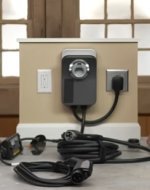Here’s an overview of the installation process, costs, and important considerations:
Installation Process
Choose the Right Charger:
Level 1 Charger: This is the simplest option, using a standard 120-volt outlet. It doesn't require installation but is the slowest option, typically providing about 3-5 miles of range per hour of charging.
Level 2 Charger: This requires a 240-volt outlet, similar to what is used for electric dryers or ovens. Level 2 chargers are much faster, providing about 20-60 miles of range per hour of charging, making them the preferred choice for home installations.
Professional Installation:
It's recommended to hire a licensed electrician to install a Level 2 charging station. This involves installing a dedicated 240-volt circuit from your electrical panel to the charging location.
The electrician will ensure the installation complies with local electrical codes and includes necessary safety features like circuit breakers and ground fault protection.

Costs
The total cost of installing a home EV charger can vary widely depending on several factors, including the type of charger, the complexity of the installation, and your location. Here’s a breakdown of potential costs:
Charger Cost:
Level 1 Charger: Typically included with the purchase of an EV, so there is no additional cost unless you buy a separate one.
Level 2 Charger: These chargers can range from $300 to $800 or more, depending on the brand and features.
Installation Cost:
Installation costs can vary based on your home's electrical system. Basic installations might cost between $300 and $600. However, if your electrical panel requires upgrading or if the charger needs to be installed far from the panel, costs can rise to $1,200 to $2,000 or more.
Additional Costs:
Permits and Inspection: Some regions require permits for installing a Level 2 charger, which can add to the cost.
Electrical Panel Upgrade: If your existing electrical panel does not have sufficient capacity, upgrading it can significantly increase the cost, potentially adding $1,000 to $3,000.
Key Considerations
Home Electrical Capacity: Ensure your home’s electrical system can handle the additional load of an EV charger. An electrician can help assess this.
Location of Charger: Ideally, install the charger close to where you park your vehicle to minimize installation costs.
Future-Proofing: Consider installing a higher capacity charger if you plan to upgrade to a vehicle with a larger battery in the future.
Benefits of Home Charging
Convenience: Charge your vehicle overnight at home without the need to visit public charging stations.
Cost Savings: Home charging is generally cheaper per kilowatt-hour compared to public chargers, especially when utilizing off-peak electricity rates.
By installing a home EV charging station, you gain the convenience of charging your vehicle overnight and can potentially save on costs compared to using public charging stations. However, it is essential to plan and budget for both the equipment and installation to ensure a seamless experience.
Youtube
Installation Process
Choose the Right Charger:
Level 1 Charger: This is the simplest option, using a standard 120-volt outlet. It doesn't require installation but is the slowest option, typically providing about 3-5 miles of range per hour of charging.
Level 2 Charger: This requires a 240-volt outlet, similar to what is used for electric dryers or ovens. Level 2 chargers are much faster, providing about 20-60 miles of range per hour of charging, making them the preferred choice for home installations.
Professional Installation:
It's recommended to hire a licensed electrician to install a Level 2 charging station. This involves installing a dedicated 240-volt circuit from your electrical panel to the charging location.
The electrician will ensure the installation complies with local electrical codes and includes necessary safety features like circuit breakers and ground fault protection.

Costs
The total cost of installing a home EV charger can vary widely depending on several factors, including the type of charger, the complexity of the installation, and your location. Here’s a breakdown of potential costs:
Charger Cost:
Level 1 Charger: Typically included with the purchase of an EV, so there is no additional cost unless you buy a separate one.
Level 2 Charger: These chargers can range from $300 to $800 or more, depending on the brand and features.
Installation Cost:
Installation costs can vary based on your home's electrical system. Basic installations might cost between $300 and $600. However, if your electrical panel requires upgrading or if the charger needs to be installed far from the panel, costs can rise to $1,200 to $2,000 or more.
Additional Costs:
Permits and Inspection: Some regions require permits for installing a Level 2 charger, which can add to the cost.
Electrical Panel Upgrade: If your existing electrical panel does not have sufficient capacity, upgrading it can significantly increase the cost, potentially adding $1,000 to $3,000.
Key Considerations
Home Electrical Capacity: Ensure your home’s electrical system can handle the additional load of an EV charger. An electrician can help assess this.
Location of Charger: Ideally, install the charger close to where you park your vehicle to minimize installation costs.
Future-Proofing: Consider installing a higher capacity charger if you plan to upgrade to a vehicle with a larger battery in the future.
Benefits of Home Charging
Convenience: Charge your vehicle overnight at home without the need to visit public charging stations.
Cost Savings: Home charging is generally cheaper per kilowatt-hour compared to public chargers, especially when utilizing off-peak electricity rates.
By installing a home EV charging station, you gain the convenience of charging your vehicle overnight and can potentially save on costs compared to using public charging stations. However, it is essential to plan and budget for both the equipment and installation to ensure a seamless experience.
Youtube
